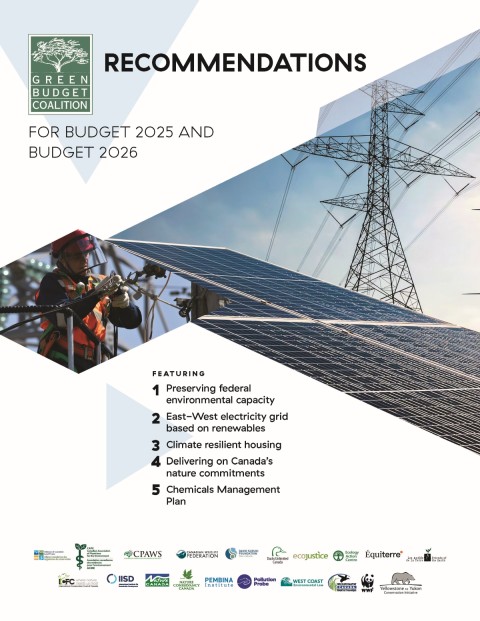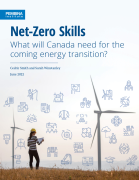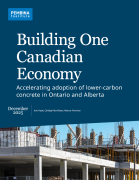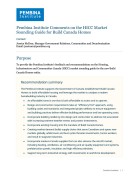The Green Budget Coalition comprises 20 of Canada’s leading environmental organizations including the Pembina Institute.
Amidst economic uncertainty, worsening climate, biodiversity and pollution crises, and fiscal limits, it is critical to preserve current capacity and further invest in strategic measures to ensure that Canada flourishes in the years ahead with dependable clean energy, energy efficient housing, climate resilience, treasured nature areas and biodiversity, healthy people, and reliable chemicals management.
The 2025 and 2026 federal budgets provide a prime opportunity, responsibility, and imperative for the federal government to renew and strengthen action on the linked climate, biodiversity, and pollution crises. Investment in environmental priorities is key to any successful approach to protecting Canada’s values and identity.
Fires, floods, stronger storms, extreme heat, ecological disruption, dramatic loss of wildlife populations, a rapidly warming Arctic, and increasing chemical and other pollution are being felt in Canada and around the world, causing widespread harm, particularly to low-income and vulnerable people, as well as huge economic costs. The climate crisis continues to accelerate, and Canada is positioned to warm at roughly twice the rate of global average. Science indicates that these and other impacts will intensify if climate change and ecosystem destruction remain unchecked.
At the same time, global efforts and investments to address these crises are expected to create many trillions of dollars in economic benefits, and help their countries be economic leaders for years to come.
To help the federal government make best use of its limited resources to address these issues, the Green Budget Coalition has utilized its expertise and years of research and discussions with government officials and Indigenous allies to develop this comprehensive set of timely budget and fiscal recommendations.
Recommendations
For Budget 2025, the Green Budget Coalition is featuring five recommendations, as part of a comprehensive package of timely and financially-astute recommendations:
1) Preserving federal environmental capacity amidst Comprehensive Expenditure Review – Encouraging the government to act cautiously and carefully to maintain core capacity for environmental and climate governance, science, programs, and policy, which are critical to enable the government to achieve its commitments and objectives, and to avoid larger costs in future;
2) Modern, resilient East-West electricity grid based on renewables – invest boldly in a modern, resilient East-West electricity grid, matching the scope and scale required by this political moment, combined with matching provincial funding for energy efficiency and demand side management, supporting Indigenous-led and community-led clean energy projects, and funding to provinces ($32 billion over five years);
3) Climate resilient housing – ensure new housing supported by Build Canada Homes and other federal housing programs meets energy efficiency standards, and scale up Canada’s retrofit industry as a nation building project, prioritizing programs established through provincial and territorial contribution agreements and those targeting non-market multi-unit housing ($13.7 billion over six years);
4) Delivering on nature commitments – renew and expand on the Enhanced Nature Legacy (protecting and connecting land and freshwater) and Marine Conservation Targets programs to continue Canada’s leadership on nature protection, and to support new conservation initiatives identified in Canada’s 2030 Nature Strategy to deliver on Canada’s obligations to the Kunming-Montreal Global Biodiversity Framework. ($4.6 billion over five years, followed by $600 million per year, ongoing); and
5) Permanently Fund Chemicals Management Plan – protecting all people in Canada from toxic chemicals and pollution ($200 million in 2026-27, followed by $300 million per year, ongoing).
It is vital that Canada redouble its commitment to the Paris Agreement, to the economy-wide emissions reductions, and to the domestic and international climate investments this entails. Budget 2022 noted that $125-140 billion needs to be invested in climate action per year by 2050.2 Canada must continue to demonstrate its willingness to do its fair share and be a constructive and serious player on the international stage.
Canada has demonstrated leadership in protecting and enhancing nature and biodiversity by adopting the Kunming-Montreal Global Biodiversity Framework (KMGBF) in 2022, and then releasing Canada’s 2030 Nature Strategy as its implementation plan. Canada now has a broad suite of commitments to halt and reverse biodiversity loss by 2030; however, renewed and expanded funding is needed to fulfill them.
For all new and ongoing programs, we emphasize the importance of effective implementation, monitoring, and evaluation to ensure successful outcomes.
In that context, it is critical to maintain the government’s core capacity for environmental governance and environmental and climate science, programs, and policy. At the same time, further progress on funding, fiscal measures, and regulations is required.
Canada must also strive to advance and embed climate, biodiversity, and environmental justice goals across government, using tools such as sustainable finance, net-zero industrial policy, climate and biodiversity conditions on funding and policy measures, and a national environmental justice strategy and screening tools.
Many of the recommendations in this document are relevant to the rights and authorities of Indigenous peoples—First Nations, Inuit, and Métis—whose traditional territories and knowledge are integral to the achievement of Canada’s climate and conservation goals. These recommendations should be considered in the context of reconciliation, and pursued in a manner in keeping with the United Nations Declaration on the Rights of Indigenous People.
In addition, Canada’s opportunities and responsibilities include leadership actions to support global progress.
Implementing these Green Budget Coalition recommendations would lead to transformative progress in advancing enduring environmental, economic, and social prosperity for all peoples in Canada from coast to coast to coast.

















